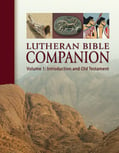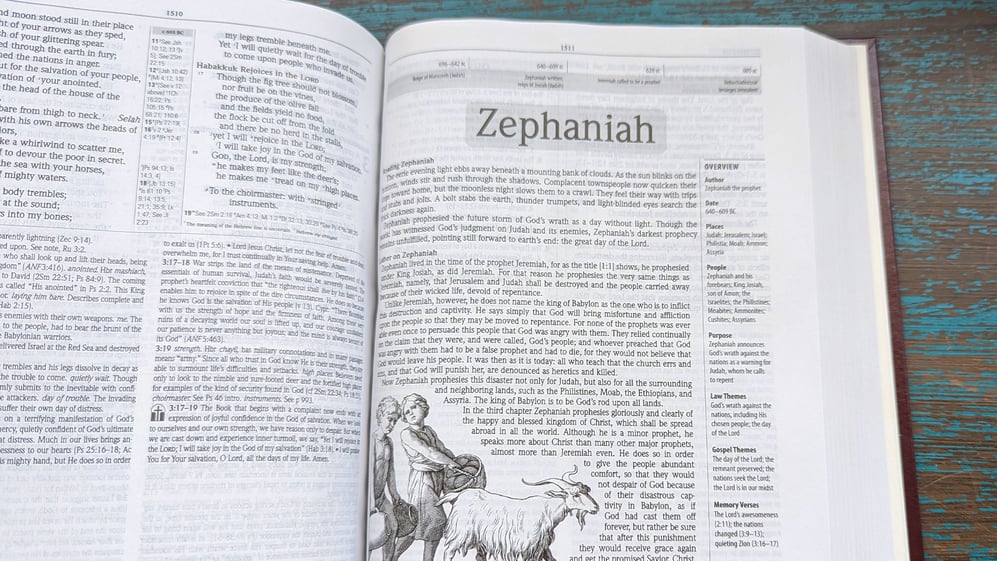The day of the Lord is a permeating theme in Zephaniah. Zephaniah recorded God’s warning to Judah and Judah’s enemies about His coming judgment. However, God also assured Judah that on the day of the Lord He will be in their midst and restore their fortunes. The following has been adapted from the Lutheran Bible Companion.
Author
Zephaniah, whose name may be translated “The LORD protects,” is the neglected prophet among those of the seventh century, especially when measured against the breadth, depth, and variety of his oracles. One cannot help but wonder whether he gets less attention because his book is an epitome of the prophetic messages during this era.
We have no more personal information about the prophet than that given in the superscription. The genealogy is unusually long, going back four generations to Hezekiah. Inevitably, that has raised more questions than answers. On the one hand, one wonders what its purpose might have been if Zephaniah’s great-great-grandfather was not the well-known king. (The name Hezekiah does not seem to have been too common.) On the other hand, if that was the intent, why was not “the king” added to the name, which would remove all ambiguity? It is difficult, but not impossible, to squeeze the required number of generations into the time available, but the brief time span does suggest that Zephaniah, like Jeremiah, may have been relatively young, at least at the time of his call. For that reason, he is occasionally referred to as the “young prophet.” If he was of royal blood, his inclusion of “the king’s sons” in the denunciations of Zephaniah 1:8 would carry extra weight.
Genre
Zephaniah, like other prophets, wrote a series of oracles and “woes,” which
he introduced as “the word of the LORD” (1:1). Zephaniah is an almost perfect example of the classical threefold prophetic outline. Each of the three chapters corresponds to a type of prophetic oracle: judgment on Judah, judgment on Gentile nations, and promise of restoration. Zephaniah frequently used the “prophetic perfect” in his pronouncements of God’s promises.
Narrative
As a collection of oracles, the Book of Zephaniah does not have a storyline or plot. Like other prophetic books, it moves from themes of judgment to redemption. The joy-filled celebration of God’s mercy toward Israel in 3:9–20 contrasts sharply with the bitter day of the Lord in chapter 1.
Application
Chapter 1:2–6
Like the rebellious people of Judah, we also deserve God’s anger when we replace God and His Word with what we find exciting, entertaining, or
perhaps financially beneficial. We, too, are guilty of arrogance, pride, and
boasting. But God’s Law shows us our sin and drives us to repentance. He
forgives our sins because Christ, our Savior, suffered judgment in our place.
Chapter 1:7–18
Zephaniah’s prophecy is meant as a warning for us (cf. 1 Corinthians 10:6), as Jesus preached, “Repent and believe in the gospel” (Mark 1:15). The final Day of Judgment will come unexpectedly, as a thief in the night (1 Thessalonians 5:2). We have all missed the mark of God’s perfection and deserve only His punishment, now and eternally. However, God so loved the world that He sent His only Son to endure the punishment for our sins. All who believe in Jesus have no need to fear the Day of Judgment
Chapters 2–3
Fear may hinder us from witnessing of God’s love and mercy; how wrong and foolish that would be! God has redeemed us in Christ. He will always be with us, and someday He will take us to the heavenly Jerusalem.
Gerhard on Zephaniah
Zephaniah prophesied chiefly about the overthrow of the kingdom of Judah. The book consists of three chapters, the first of which is a threat containing the prophecy of visitation by the Chaldeans; the second, an exhortation to repentance; and the third, a mixture of warning and consolation that contains a prophecy about the calling of the Gentiles and the extension of the Church that was to be awaited at the time of the Messiah. (ThC E1 § 164)
Text adapted from the Lutheran Bible Companion, Volume 1: Introduction and Old Testament (pp. 961–68), © 2014 CPH. All rights reserved.
Image from The Lutheran Study Bible, © 2009 CPH. All rights reserved.
Scripture: ESV®.
 To learn more about Zephaniah, explore the Lutheran Bible Companion.
To learn more about Zephaniah, explore the Lutheran Bible Companion.












